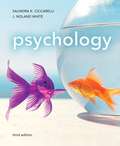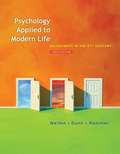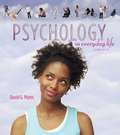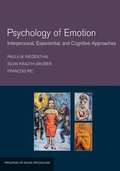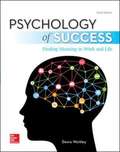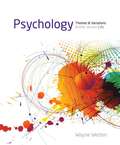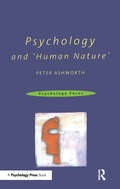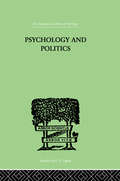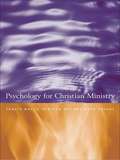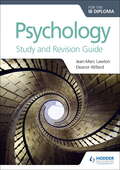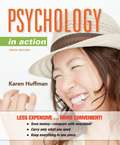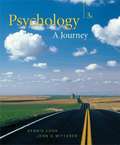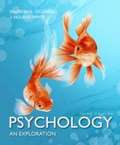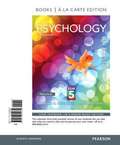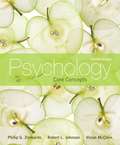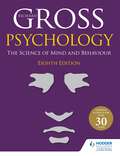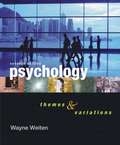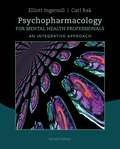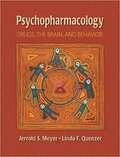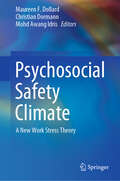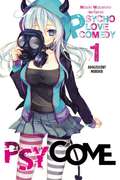- Table View
- List View
Psychology (3rd Edition)
by Saundra K. Ciccarelli J. Noland WhiteThe most learner-centered and assessment-driven text available With its engaging writing style and comprehensive coverage of key research, Psychology, 3/e, awakens students' curiosity and energizes their desire to learn more. This brief version draws readers into an ongoing dialogue about psychology, allowing them to fully grasp the subject. The authors establish clear learning objectives tied to the most recent APA-recommended undergraduate learning outcomes. MyPsychLab is an integral part of the Ciccarelli/White program. Engaging activities plus assessments provide a teaching and learning system that helps students master psychological concepts more readily. With MyPsychLab, students can watch videos on research and applications, participate in virtual classic experiments, and develop critical thinking skills through writing. Psychology, 3/e, is available in a new DSM-5 Updated Edition. To learn more, click here. This title is available in a variety of formats - digital and print. Pearson offers its titles on the devices students love through Pearson's MyLab products, CourseSmart, Amazon, and more.
Psychology Applied to Modern Life: Adjustment in the 21st Century (10th Edition)
by Wayne Weiten Dana S. Dunn Elizabeth Yost HammerFilled with comprehensive, balanced coverage of classic and contemporary research, relevant examples, and engaging applications, this book shows you how psychology helps you understand yourself and the world--and uses psychological principles to illuminate the variety of opportunities you have in your life and your future career.
Psychology In Everyday Life, 2nd Edition
by David G. MyersCarried by the author's acclaimed empathetic voice, Psychology in Everyday Life is David Myers' most inviting text to date. This book represents a breakthrough in the interplay of text and visuals, yet, as always, provides a rich source of scientific insights into the lives we live. Any student, regardless of age or background, will find it a text that speaks directly to him or her, and will embrace it not just for its grade-raising potential, but for its revelations about what makes a person a stronger student, a more tuned-in friend or partner, a more effective worker, or a wiser parent.
Psychology Of Emotion: Interpersonal, Experiential, And Cognitive Approaches
by Paula M. Niedenthal Silvia Krauth-Gruber François RicThis textbook discusses fundamental issues in the definition and measurement of emotion, including: conscious and unconscious processes; the ways in which emotions arise in, and are constrained by, social situations and social processes; the regulation and sharing of emotion and their effects of mental health; and the manner in which culture (including subculture) shapes or moderates some of these processes. The book also focuses on the component processes of emotion, their functions, and the ways in which these interact with the social environment. Rather than deny either that emotions are biologically determined or that they are culturally created or shaped, both biology and social situation are treated as important forces in the elicitation and the experience of emotion. Each section of the book is structured around specific approaches or models, and the precise questions that they were constructed to address. The theories and models are also placed in their in historical context. Discussion of the different approaches is elaborated by summaries of the extant scientific evidence, as well as examples of specific experiments or studies that were designed to evaluate the question. Timely, engaging real-world examples are used from a variety of international contexts. The pedagogic features, including concise introductions and summaries, discussion questions, and suggested readings, have been incorporated into the volume, making this an ideal text for a course of Emotion, which can be found as an option within many social psychology and cognitive psychology courses.
Psychology Of Success
by Denis WaitleyPsychology of Success introduces the fundamental psychological principles of success--principles applicable to everyone regardless of age, background, or specialty. Unlike many psychology books, Psychology of Success doesn't take a one-size-fits-all approach. Instead, it asks you to take an active role in defining what is right for you as an individual. Psychology of Success calls on you to use self-awareness and critical thinking strategies to examine your dreams, values, interests, skills,needs, identity, self-esteem, and relationships. This will help you set and achieve goals that are in harmony with your personal vision of success.
Psychology Themes and Variations, Briefer Version, Ninth Edition
by Wayne WeitenPSYCHOLOGY: THEMES AND VARIATIONS, BRIEFER EDITION, 9TH EDITION helps you experience the excitement of this fascinating field, while helping you study and retain what you learn! Filled with practical ways that you can apply psychology to your everyday life, this best-selling psychology textbook is an experience in learning that you'll remember long after you complete your introductory psychology course. Critical Thinking Applications in every chapter give you specific critical thinking strategies you can apply to what you read. Every chapter of this book offers tools to help you focus on what's important and shows you how to study in ways that help you retain information and do your very best on exams.
Psychology and 'Human Nature'
by Peter AshworthPsychology and 'Human Nature' problematizes what psychology usually takes for granted - the meaning of the psyche or 'human nature'. Peter Ashworth provides a coherent account of many of the major schools of thought in psychology and its related disciplines, including: sociobiology and evolutionary psychology, psychoanalysis, cognitive psychology, radical behaviourism, existentialism, discursive psychology and postmodernism. For each approach he considers the claims or assumptions being made about 'human nature', especially regarding issues of consciousness, the self, the body, other people and the physical world.Psychology and 'Human Nature' will be essential reading for all students of psychology.Series Details; The Psychology Focus Series provides students with a new focus on key topic areas in psychology.Each short book:* presents clear, in-depth coverage of a discrete area with many applied examples* assumes no prior knowlede of psychology* has been written by an experienced teacher* has chapter summaries, annotated further reading and a glossary of key terms
Psychology and Life
by Philip G. ZimbardoThe classic text that defined the field, Psychology and Life, Fifteenth Edition, celebrates Phil Zimbardo's 30th anniversary as its author by returning to its original themes: presenting psychology as a science and as a tool to understanding our daily lives. The book continues to provide a rigorous, research-centered survey of the discipline while offering students features and pedagogy that will spark their interest and excite their imaginations.
Psychology and Politics: And other Essays (International Library Of Psychology)
by Rivers, W H RFirst published in 1999. Routledge is an imprint of Taylor & Francis, an informa company.
Psychology for Christian Ministry
by Fraser Watts Rebecca Nye Sara SavageThis introduction to psychology has been devised for those training for and working in the clergy. Ideal both as a professional handbook and a textbook, it covers social, developmental, educational, occupational and counselling psychology, as well as the psychology of religion. It carefully considers the processes of personal change and growth central to religion.
Psychology for the IB Diploma Study and Revision Guide
by Eleanor Willard Jean-Marc LawtonExam board: International BaccalaureateLevel: IB DiplomaSubject: PsychologyFirst teaching: September 2017First exams: Summer 2019Encourage students to achieve their best grade by simplifying and focussing exam preparation with full syllabus coverage, practical exam tips and practice questions. · Ensure thorough exam preparation with full coverage of the syllabus including concise revision notes and clear explanations of the requirements and topics. · Focus on related vocabulary with key terms highlighted for each topic/sub-topic.· Give examples of what is required to achieve the best grades with examiner advice and tips, including the common mistakes to avoid.· Reinforce understanding and consolidate learning and exam focus with Exam Practice Questions.
Psychology in Action 10th Edition
by Karen HuffmanThis flagship book's 10th edition helps students examine their own personal studying and learning styles with several new pedagogical aids -- encouraging students to apply what they are learning to their everyday lives.
Psychology: A Journey
by Dennis Coon John O. MittererIn a course where professors are frequently confronted by students who haven't actually read their textbooks, this text offers a solution. The shortest, most succinct of the books written by Dennis Coon, PSYCHOLOGY: A JOURNEY presents psychology in a way that sparks readers' curiosity, insights, imagination, and interest getting students "hooked" on psychology and eager to read on. The first author to integrate the proven SQ4R (survey, question, read, recite, relate, and review) active learning system into a psychology textbook, Coon helps readers grasp major concepts, develop a broad understanding of psychology's diversity, and see for themselves how psychology relates to the challenges of everyday life. Because readers become actively involved with the material, they develop a basic understanding of psychology that they take with them into their future courses and careers.
Psychology: An Exploration (3rd Edition)
by Saundra K. Ciccarelli J. Noland WhiteNow in its third edition, Psychology: An Exploration draws students into the discipline by showing how psychology relates to their own lives. Clear learning objectives, based on the recommended APA undergraduate learning outcomes, guide students through the material. And assessment tied to these learning objectives lets students check their understanding, while allowing instructors to monitor student progress and intervene when necessary to bolster student performance.
Psychology: An Exploration with DSM5 Update
by J. Noland White Saundra CiccarelliUsing the most recent recommended APA undergraduate psychology learning outcomes, the authors establish clear learning objectives for students that are tied to these objectives. Student and instructors praise Ciccarelli and White's approach to teaching and learning in today's classroom. The thirteen-chapter table of contents covers the essentials that every introductory psychology student should know and fits easily into a one-semester course.
Psychology: Core Concepts
by Philip G. Zimbardo Robert L. Johnson Vivian MccannWhere great science meets great teaching. At just fourteen chapters, Psychology: Core Concepts provides rich coverage of the foundational topics taught in most introductory courses. Psychology: Core Concepts focuses on a manageable number of core concepts (usually three to five) in each chapter, allowing students to attain a deeper level of understanding of the material. Learning is reinforced through focused application and critical thinking activities, and connections between concepts are drawn across chapters to help students see the big picture of psychology as a whole. The 7th edition features an enhanced critical thinking emphasis, with new chapter-opening "Problems" and new end-of-chapter critical thinking applications that promote active learning.
Psychology: Principles in Practice
by Spencer A. RathusOne needs to develop a variety of critical thinking skills to fully grasp the range of concepts and methods used in the study of psychology and this book guides one to achieve that.
Psychology: The Science of Mind and Behaviour 8th Edition
by Richard GrossBuild a solid foundation for students to develop the skills and knowledge they need to progress with the updated edition of Richard Gross's best-selling introduction to Psychology.This 8th edition of Psychology: The Science of Mind and Behaviour is the essential guide to studying Psychology, helping over half a million students during its 30 years of publication.- Easily access psychological theories and research with user-friendly content and useful features including summaries, critical discussion and research updates.- Develop evaluative skills, with new evaluation boxes, encouraging students to put classic and contemporary studies into context.- Consolidate understanding by identifying common misconceptions.- Stay up to date with revised content and the latest psychological research.- Understand the research process with updated contributions from leading Psychologists including Elizabeth Loftus, Alex Haslam and David Canter.
Psychology: Themes and Variations (Seventh Edition)
by Wayne WeitenThe Seventh Edition of Wayne Weiten's popular text, Psychology: Themes and Variations, continues to offer students a unique survey of psychology with three distinct goals: to show both the unity and diversity of psychology's subject matter; to illuminate the process of research and its intimate link to application, and to make the text challenging to think about and easy to learn from.
Psychopharmacology for Mental Health Professionals: An Integrative Approach (2nd Edition)
by R. Elliott Ingersoll Carl F. RakThis book is an introductory level text on psycho-pharmacology for students preparing for careers in psychology, counselling, and social work.
Psychopharmacology: Drugs, the Brain, and Behaviors (2nd Edition)
by Richard A. Harvey Michelle A. Clark Richard Finkel Jose A. Rey Karen WhalenRecent advances in molecular pharmacology and brain imaging have revolutionized our understanding of how psychoactive drugs work. Now, from the authors of Principles of Neuropsychopharmacology, comes a new undergraduate textbook integrating these developments. The first section of the book provides extensive foundation materials, including the basic principles of pharmacology, neurophysiology and neuroanatomy, synaptic transmission, and methods in psychopharmacology. The second section describes key features of major neurotransmitter systems, including the catecholamines, serotonin, acetylcholine, glutamate and GABA. The third and fourth sections discuss theories and mechanisms of drug addiction and psychopathology. All major substances of abuse as well as drugs used to treat mental illness are covered. Psychopharmacology: Drugs, the Brain and Behavior is unique in its breadth of coverage, ranging from historical accounts of drug use to clinical and preclinical behavioral studies to the latest research on drug effects in transgenic mouse models. Student engagement with the material is fostered by opening each chapter with a relevant vignette and by providing breakout boxes presenting novel or cutting-edge topics for special discussion. The book is extensively illustrated with full-color photographs and line art depicting important concepts and experimental data. Psychopharmacology: Drugs, the Brain and Behavior is appropriate for undergraduate psychopharmacology or drugs and behavior courses that emphasize relationships between the behavioral effects of psychoactive drugs and their mechanisms of action.
Psychosocial Aspects of Disability (Fourth Edition)
by George Henderson Willie V. BryanThis new edition of Psychosocial Aspects of Disability strikes a balance of past, present, and future views of individual, family, societal, and governmental interaction and reaction to persons with disabilities. The past is presented in Part 1, Psychosocial Aspects of Disabilities, in which a view of the evolution of societal reactions to disabilities and persons with disability is presented. This perspective is important because it explains how some of the beliefs and attitudes toward disabilities and those who have a disability have developed. Additionally, Part 1 makes us aware from a historical perspective why persons with disabilities have been subject to certain types of treatment from family, friends, and society. Parts 2 and 3 provide discussion of present situations for persons with disabilities as they move toward better inclusion in society. Chapter 5 discusses the need for empowerment of persons with disabilities and how they can empower themselves. Chapter 6 discusses the need for better employment opportunities for persons with disabilities because this is a significant way of empowering persons with disabilities. Chapter 7 discusses federal legislation that has been developed to facilitate the empowerment of persons with disabilities. Part 4, Psychosocial Issues, to a large extent, represents the future for persons with disabilities. The chapters in this section discuss some disability issues that some persons with disabilities will encounter and/or by which they will be affected during the twenty-first century. Additionally, there is discussion of the need for persons with disabilities to attain the full human rights to which they are entitled.
Psychosocial Safety Climate: A New Work Stress Theory
by Maureen F. Dollard Christian Dormann Mohd Awang IdrisThis book is a valuable, comprehensive and unique reference text on Psychosocial Safety Climate (PSC), a new work stress theory. It proposes a new PSC theory concerning the corporate climate for workers’ psychological health, its origins and implications for work stress, and provides a critique of current research and theories. It provides a comprehensive review of all PSC studies to date. The chapters discuss state-of-the-art empirical evidence testing PSC theory in relation to management roles, organisational resilience, corruption, organisational status, cultural perspectives, illegitimate tasks, high PSC work groups, PSC variability in work groups, etc. They investigate outcomes such as psychological distress, emotional exhaustion, depression, worry, engagement, health, cognitive decline, personal initiative, boredom, cynicism, sickness absence, and productivity loss, in various workplace settings across many countries. This unique book allows practitioners to rapidly update practical measures, benchmarks and processes, and provides students and trainees with an introduction to PSC and important concepts and methods, quantitative and qualitative, in occupational health with leads to further sources. Students as well as experts on occupational health and safety, human resource management, occupational health psychology, organisational psychology and practitioners, unions and policy makers will find this book highly informative. It covers relevant materials for undergraduate and postgraduate education, drawing upon the concepts, topics and methods (diary, multilevel, longitudinal, qualitative, data linkage) within the multidisciplinary occupational health area.
Psycome, Vol. 1: Murderer in the Flower of Death
by Namanie Mizuki MizushiroAccused of a crime he didn't commit, Kyosuke Kamiya is sent to Purgatorium Rehabilitation Academy. Suddenly, he's surrounded by a variety of fetching lasses--each one a murderer! Worse, he's famous for being the "Dozen Demon," a killer responsible for twelve deaths! When the busty, gas mask-wearing beauty Renko Hikawa approaches him, the difference between death and desire becomes very narrow indeed. How is Kyosuke gonna graduate alive?
